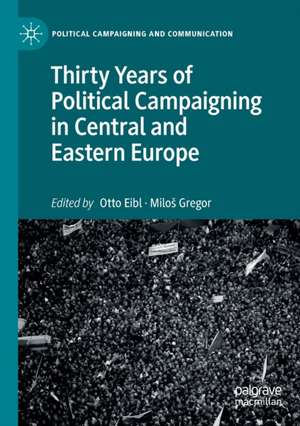Thirty Years of Political Campaigning in Central and Eastern Europe: Political Campaigning and Communication
Editat de Otto Eibl, Miloš Gregoren Limba Engleză Paperback – 31 oct 2020
| Toate formatele și edițiile | Preț | Express |
|---|---|---|
| Paperback (1) | 785.42 lei 43-57 zile | |
| Springer International Publishing – 31 oct 2020 | 785.42 lei 43-57 zile | |
| Hardback (1) | 790.61 lei 43-57 zile | |
| Springer International Publishing – 31 oct 2019 | 790.61 lei 43-57 zile |
Din seria Political Campaigning and Communication
-
 Preț: 152.45 lei
Preț: 152.45 lei - 20%
 Preț: 690.35 lei
Preț: 690.35 lei -
 Preț: 353.61 lei
Preț: 353.61 lei - 18%
 Preț: 729.84 lei
Preț: 729.84 lei - 15%
 Preț: 695.85 lei
Preț: 695.85 lei - 18%
 Preț: 890.37 lei
Preț: 890.37 lei - 15%
 Preț: 643.65 lei
Preț: 643.65 lei - 15%
 Preț: 586.23 lei
Preț: 586.23 lei -
 Preț: 415.52 lei
Preț: 415.52 lei - 18%
 Preț: 780.19 lei
Preț: 780.19 lei - 18%
 Preț: 724.50 lei
Preț: 724.50 lei -
 Preț: 382.57 lei
Preț: 382.57 lei - 18%
 Preț: 890.23 lei
Preț: 890.23 lei - 18%
 Preț: 726.85 lei
Preț: 726.85 lei - 18%
 Preț: 895.58 lei
Preț: 895.58 lei - 18%
 Preț: 725.43 lei
Preț: 725.43 lei -
 Preț: 390.63 lei
Preț: 390.63 lei
Preț: 785.42 lei
Preț vechi: 957.83 lei
-18% Nou
Puncte Express: 1178
Preț estimativ în valută:
150.30€ • 155.97$ • 125.63£
150.30€ • 155.97$ • 125.63£
Carte tipărită la comandă
Livrare economică 17-31 martie
Preluare comenzi: 021 569.72.76
Specificații
ISBN-13: 9783030276959
ISBN-10: 3030276953
Pagini: 426
Ilustrații: XXV, 426 p.
Dimensiuni: 148 x 210 mm
Greutate: 0.54 kg
Ediția:1st ed. 2019
Editura: Springer International Publishing
Colecția Palgrave Macmillan
Seria Political Campaigning and Communication
Locul publicării:Cham, Switzerland
ISBN-10: 3030276953
Pagini: 426
Ilustrații: XXV, 426 p.
Dimensiuni: 148 x 210 mm
Greutate: 0.54 kg
Ediția:1st ed. 2019
Editura: Springer International Publishing
Colecția Palgrave Macmillan
Seria Political Campaigning and Communication
Locul publicării:Cham, Switzerland
Cuprins
1. A Brief Historical Overview of Political Campaigning: Theories, Concepts and Approaches (Otto Eibl, Miloš Gregor).- Part I. Baltic States.- 2. Characteristics of the Baltic States (Vít Hloušek).- 3. Estonia (Marju Lauristin, Sten Hansson).- 4. Latvia (Ieva Bērziņa).- 5. Lithuania (Ingrida Unikaitė – Jakuntavičienė).- 6. Summary for the Baltic States (Otto Eibl).- Part II. Central Europe.- 7. Characteristics of the Central Europe (Lubomír Kopeček).- 8. Czech Republic (Miloš Gregor).- 9. Hungary (Gabriella Szabo, Balazs Kiss).- 10. Poland (Wojciech Cwalina, Milena Drzewiecka).- 11. Slovakia (Jozef Zagrapan).- 12. Summary for Central Europe (Miloš Gregor).- Part III. The Balkans.- 13. Characteristics of the Balkans (Věra Stojarová).- 14. Albania (Afrim Krasniqi).- 15. Bosnia and Herzegovina (Adnan Huskić).- 16. Bulgaria (Ivanka Mavrodieva).- 17. Croatia (Marija Grbeša, Berto Šalaj).- 18. North Macedonia (Mirjana Maleska).- 19. Romania (Ruxandra Boicu, Adriana Stefanel, Silvia Breanea).- 20. Slovenia (Alenka Krašovec, Tomaž Deželan).- 21. Serbia (Siniša Atlagić, Dušan Vučićević).- 22. Summary for the Balkans (Miloš Gregor).- Part IV. Eastern Europe.- 23. Characteristics of Eastern Europe (Jan Holzer).- 24. Moldova (Igor Munteanu).- 25. Ukraine (Larisa Doroshenko).- 26. Russia (John Ishiyama).- 27. Summary for Eastern Europe (Otto Eibl).- Part V. Conclusion.- 28. Conclusion (Otto Eibl, Miloš Gregor).
Recenzii
“For professionals and scholars who only seek brief, structured information about electoral campaigns in a complex region with which they are unfamiliar, it may provide a useful compilation of overviews and a research primer. For that, and for integrating Central and Eastern European perspectives into international scholarly discourse, and for their highly timely effort to contend with the political developments of a generation, the authors and editors deserve praise.” (Máté Mátyás, Europe-Asia Studies, Vol. 73(4), 2021)
Notă biografică
Otto Eibl is Assistant Professor at the Department of Political Science, Masaryk University, Czech Republic. His research focuses on political communication, branding and marketing, and he also teaches courses on these subjects.
Miloš Gregor is Assistant Professor at the Department of Political Science, Masaryk University, Czech Republic. His research interests include political marketing, branding, and public relations in politics. He teaches courses on political communication and marketing, propaganda, disinformation, and fake news.
Miloš Gregor is Assistant Professor at the Department of Political Science, Masaryk University, Czech Republic. His research interests include political marketing, branding, and public relations in politics. He teaches courses on political communication and marketing, propaganda, disinformation, and fake news.
Textul de pe ultima copertă
This edited volume maps the development of the use of political campaigning and marketing techniques in countries of the former Communist Bloc over the last thirty years. Focusing on the shift from propaganda to political marketing, and from manipulation to persuasion, the book consists of a series of case studies of countries in Central Europe, Eastern Europe, the Baltics, and the Balkans that outline the history, development and current state of political marketing in each country. The authors explore political parties and their behaviour ahead of elections, and show the changes in political culture and practices that parties have undergone in order to create more or less successful campaigns.Otto Eibl is Assistant Professor at the Department of Political Science, Masaryk University, Czech Republic. His research focuses on political communication, branding and marketing, and he also teaches courses on these subjects.
Miloš Gregor is Assistant Professor at the Department of Political Science, Masaryk University, Czech Republic. His research interests include political marketing, branding, and public relations in politics. He teaches courses on political communication and marketing, propaganda, disinformation, and fake news.
Miloš Gregor is Assistant Professor at the Department of Political Science, Masaryk University, Czech Republic. His research interests include political marketing, branding, and public relations in politics. He teaches courses on political communication and marketing, propaganda, disinformation, and fake news.
Caracteristici
Explores political marketing in the 'new' European democracies Captures the unique features that marked electoral campaigns in each of the countries examined Employs a comparative approach on regional and sub-regional levels
